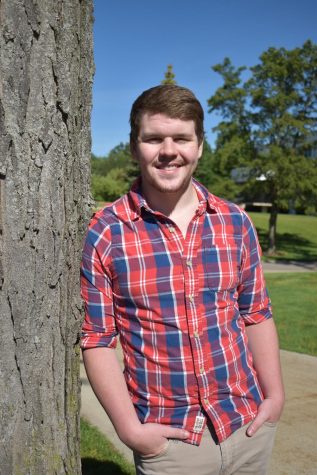Envisioning the future of how journalism, community intersect

GVL Archives
Sep 20, 2021
There were several factors that led me to my decision of spending four years studying at Grand Valley State University. The school is close to home, the campus is beautiful and the class sizes are small.
I knew I had an interest in podcasting and sports journalism. I decided to major in the subject when I first came to Allendale for orientation. Since then, the CMJ major at GVSU hasn’t disappointed me in the slightest bit.
The school offers multiple organizations such as GVTV, The Whale Radio station, the GVSU Podcast Network and of course, the Lanthorn. The university also stocked the teaching department with excellent professionals like James Ford, Jeffery Kelly-Lowenstein, Len O’Kelly and Eric Harvey.
I have learned so much from each of these professors. Like most majors I’m sure, students start out with the basic fundamentals of their traits in their early years at GVSU. Now that I’m a senior, I find myself exploring more complicated topics, changing aspects of journalism and what the field may look like after I graduate.
According to Forbes, 56% of Americans agree with the following statement: “Journalists and reporters are purposely trying to mislead people by saying things they know are false or gross exaggerations.”
While I do disagree that journalists are purposefully reporting fake news to trick the public, (except for cases like FOX News), I do understand the distrust in the media that Americans obviously have.
The issue is that national media outlets do have a clear agenda. Profitability drives large media organizations. This can lead to sensationalizing stories, covering politics like sports and prioritizing quantity over quality. Social media, the 24-hour news cycle and the race to be the first to cover a story has led to stories being published too soon and sometimes misinformed.
All of these issues have led to the massive gates between media outlets and their audiences. In order to fix these systemic issues, journalists need to engage and help their communities more effectively.
Engaging audiences is easier said than done. Take the 2016 Presidential Election for example. Instead of covering foreign policy, economic and domestic issues, CNN prioritized Donald Trump’s gaffs, ridiculous quotes, and running his full rallies. In 2016, this strategy was excellent television and kept viewers coming. Their coverage tackled material like “who won the debate,” “who said what about who,” and dissections of the weekly polls.
Is that what audiences really want to hear about? I’m sure most people would like journalists to follow the candidates’ policies, their fitness for office and what they would change if elected. Media organizations need to engage with their audiences to cover these topics they deem necessary. Doing this would help voters make their decisions more wisely and thus enact the actual change that they desire.
Journalists need to offer their communities paths to take for change. Take Outlier Media for example. This organization specializes in listening to community needs and providing resources for those in need.
The outlet serves their community by reporting on stories their audiences want to hear. Landlord disputes and local government problems are covered because the citizens in Detroit asked for them to be covered. They offer solutions to problems by presenting resources to those who have been exploited by landlords and provide basic information on local elections that can help a citizen decide who they’ll vote for.
This is the type of journalism that many people, including myself, want to see in the future. When I graduate from GVSU, I look forward to joining an organization with similar goals and to continue slowly changing the field in the right direction.
In the meantime, I’ll be continuing to serve the GVSU community as Editor-in-Chief of the Lanthorn. I’m extremely proud of my staff and friends for the work they do to serve the community. That being said, there is always room for improvement. If anyone reading this column has a particular story, problem or issue on campus that they feel needs to be covered, email [email protected] or ask us on Twitter @GVLanthorn.
























